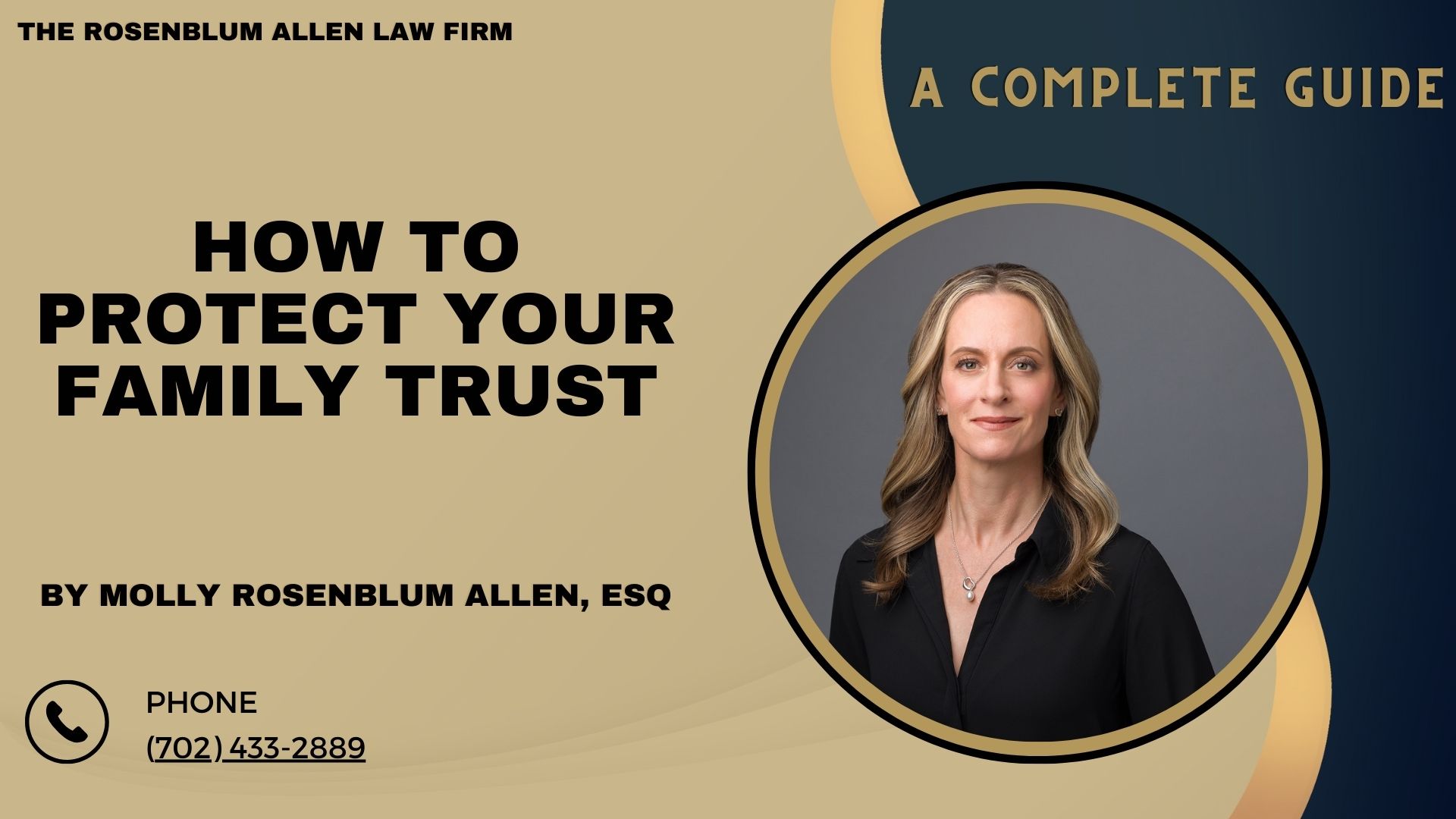Trust can be a powerful tool when it comes to securing the future of your family. Setting it up is only part. It also needs to last through time, legal changes, and life’s surprises. This guide will walk you through the key steps and strategies. They will protect your family’s trust. This will ensure it serves its purpose well.
Note: Make sure to also check out our Revocable Living Trust Nevada and Asset Protection Trust in Nevada posts while you’re here.

 Establishing a Solid Foundation
Establishing a Solid Foundation
Choosing the Right Type of Trust
Protecting your family’s trust begins with selecting the appropriate type of trust. There are two main types of trusts. They are revocable and irrevocable trusts. Each serves different needs and has distinct advantages and disadvantages.
Revocable Trusts allow you to retain control over the assets during your lifetime, with the flexibility to alter the trust as needed. However, they offer less protection against creditors and legal judgments.
Irrevocable Trusts, once established, cannot be easily changed. This rigidity can be a disadvantage, but it protects against legal challenges and creditors, making assets more secure for future generations.
Pros and Cons of Each Type
Revocable Trusts:
Pros: Flexibility, control by the grantor, and ease of amendment.
Cons: Less protection from creditors and can be considered part of the estate for tax purposes.
Irrevocable Trusts:
Pros: Greater asset protection and potential tax benefits.
Cons: The grantor loses control over the trust assets.
Selecting Trustworthy Trustees
Choosing the right trustee or trustee to manage your trust is crucial. They will manage the trust’s assets and carry out its terms. So, selecting someone reliable, honest, and understanding your family’s needs is vital.
Characteristics of an Ideal Trustee
Trustworthiness: Someone who can be depended on to act in the best interests of the beneficiaries.
Financial Savvy: Ideally, they should understand financial matters and investment strategies well.
Impartiality: The ability to act reasonably towards all beneficiaries.
The Role of Professional Trustees
Sometimes, it may be wise to appoint a professional trustee (such as a bank or a trust company) to manage the trust. This can be very useful. It’s true if the trust is big or complex. It’s also true if no good individual trustee is available.
Pros: Professionalism, experience, and impartiality.
Cons: Fees and less personal knowledge of the beneficiaries and family dynamics.

Legal Protections for Your Trust
Utilizing Trust Protectors
A relatively newer concept in trust law is the use of trust protectors. They oversee the trust. They ensure it stays relevant and safe from law and family changes.
The Role of a Trust Protector
Overseeing Trustees: They can monitor their actions, ensuring they align with the trust’s objectives.
Amending the Trust: Trust protectors can amend the trust in response to legal changes or shifts in family circumstances.
How to Choose a Trust Protector
Choosing a trust protector involves the same considerations as picking a trustee. The key is understanding legal and financial complexities. Often, companies select a legal or financial professional for this role.
Protecting your family’s trust is ongoing. It requires a solid foundation, the right legal structures, and proactive management. By addressing these areas completely. You can ensure that your trust stays a strong safeguard for your family’s future.

Enhancing Privacy and Security
Privacy Measures for Trust Documents
Today’s digital age makes it crucial to protect the privacy of your trust documents. Ensuring that sensitive information remains confidential can safeguard your family’s assets and intentions.
Secure Storage and Access Control
Physical Documents: Store in a secure location such as a safe deposit box or a fireproof safe, accessible only to authorized individuals.
Digital Documents: Use encrypted storage solutions and limit access with strong passwords.
Digital Security Measures
Regular Software Updates: Keep all software current to protect against security vulnerabilities.
Two-Factor Authentication: Use this for all digital accounts related to the trust to add an extra layer of security.
Protecting Assets from Creditors and Legal Judgments
Protecting your family’s trust safeguards assets. It does so against creditors and legal judgments.
Asset Protection Trusts
Asset protection trusts aim to offer a more robust shield for your assets. These trusts can be complex, and their laws vary by jurisdiction.
Domestic Asset Protection Trusts (DAPTs): Available in some states, they offer a level of protection for the assets from creditors.
Offshore Trusts: Located in jurisdictions with favorable asset protection laws, offering an even greater level of protection but with additional complexity and costs.
Legal Strategies to Shield Assets
Timing: Transferring assets before any legal claims arise is crucial, as transfers made after can be contested.
Compliance: Ensuring all transfers comply with laws and regulations to avoid accusations of fraud.

Family Dynamics and Conflict Resolution
Communicating Trust Objectives to Beneficiaries
Open and clear communication about the trust’s goals, benefits, and duties can prevent misunderstandings. It can also prevent conflicts for beneficiaries.
Setting Expectations and Educating Beneficiaries
Regular Meetings: Hold meetings to discuss the trust’s status, objectives, and beneficiaries’ roles.
Education: Provide resources or workshops on financial literacy to help beneficiaries understand how to manage their inheritances effectively.
Handling Beneficiary Concerns and Questions
Open Door Policy: Encourage beneficiaries to express their concerns and ask questions.
Responsive Approach: Address concerns promptly and transparently to build trust and prevent conflicts.
Mediation and Dispute Resolution
Even with the best planning, disputes can arise. Having ways to mediate and resolve disputes can keep family harmony. It can also protect trust.
Preventing and Managing Family Conflicts
Proactive Conflict Resolution: Identify potential sources of conflict early and address them through mediation or family meetings.
Neutral Mediator: In disputes, a neutral third party can help mediate and find a resolution acceptable to all parties.
The Role of Professional Mediators in Trust Disputes
Expertise: Professional mediators with experience in trust and estate disputes can provide the necessary knowledge to navigate complex issues.
Impartiality: Their neutral stance helps ensure fair and unbiased resolution processes.
Protecting your family’s trust is a journey. It requires attention to legal, financial, and personal dynamics. Put strong protection strategies. Ensure clear communication. Foster a cooperative family environment. These steps will safeguard the trust’s assets. They will ensure it serves its purpose for future generations.

Breaking It All Down
You must protect your family’s trust. It is a complex duty. It goes beyond its setup. It needs constant attention. It changes in response to law and life. You need a proactive approach to manage and protect it. Let’s recap the key areas we’ve explored. This will ensure your trust stays a solid foundation for your family’s future.
Establishing a Solid Foundation: Begin with the right type of trust and select trustworthy and capable trustees. This foundation is critical for everything that follows.
Legal Protections for Your Trust: Utilize trust protectors and regularly review your documents to adapt to legal changes and personal circumstances. This ensures your trust remains effective and compliant.
Financial Management Strategies: Implement sound investment strategies and ensure trust assets to protect against unforeseen circumstances. Regular financial reviews with professional advisors will help maintain the trust’s health.
Tax Planning and Compliance: Understand the tax implications for your trust and engage in strategies to minimize liabilities. Staying compliant with tax filing requirements is essential to avoid penalties.
Enhancing Privacy and Security: Protect the privacy of your trust documents and the security of trust assets through careful planning and technology.
Family Dynamics and Conflict Resolution: Communicate openly with beneficiaries and use mediation strategies to handle disputes. This maintains harmony and ensures that the trust fulfills its intended purposes.
The Ongoing Nature of Trust Protection
Trust protection is not a one-time effort but a continuous process that adapts over time. As laws change, assets grow, and family dynamics evolve, your trust must evolve. Engaging with professionals for legal, financial, and tax advice can give the needed skills. To handle these changes well, you need them.
Encouraging Proactive and Informed Trust Management
Stay informed and proactive. This will ensure your family trust keeps serving its purpose. It protects and benefits your family for generations. Regular reviews, open communication, and a willingness to adjust strategies are critical. Your family’s trust requires them for long-term success and protection.
Remember, the goal of a family trust is to not just protect assets. It is to provide for and protect your family’s future. With careful planning and hard work, your trust can be a lasting legacy. It will support your loved ones for many years because it can adapt.
Protecting your family’s trust is a big duty. It needs a mix of legal skill, financial smarts, and personal care. With the right support and knowledge, taking on this duty can show that you care about your family’s well-being. It shows your foresight and dedication.

Frequently Asked Questions
What if the trustee I’ve chosen can no longer serve?
If your primary trustee is unable to serve due to various reasons like incapacity or death, it’s essential to have named successor trustees in your trust document. This ensures a smooth transition and continuity in trust management.
Can I modify the terms of an irrevocable trust if circumstances change?
While irrevocable trusts are typically designed to be unchangeable, there are mechanisms such as decanting or judicial modification that allow for changes under certain circumstances. These changes must align with the trust’s purpose and may require legal assistance.
How frequently should I review my trust with a professional?
It’s advisable to review your trust with a legal or financial professional at least every three to five years or during significant life events, changes in laws, or economic conditions.
What’s the distinction between a trust protector and a trustee?
A trust protector oversees the trustee and may have powers to change trustees, amend trust terms, and more, depending on the trust’s provisions. Trustees manage the trust’s day-to-day operations and make decisions benefiting the beneficiaries according to the trust’s terms.
How can I ensure the privacy of my trust after my demise?
Trusts generally bypass the public probate process, offering more privacy than wills. Ensuring that trustees understand the importance of confidentiality and take necessary steps to protect sensitive information is crucial.
What role does life insurance play in a family trust?
Life insurance policies owned by the trust can provide liquidity to cover taxes, debts, or support beneficiaries, while ensuring the preservation and management of other trust assets according to its terms.
How do I handle foreign assets within my family trust?
Foreign assets may have different legal and tax implications, necessitating consultation with professionals well-versed in international estate planning to navigate this complexity and integrate these assets into the trust strategy effectively.
Can a family trust shield assets from divorce proceedings?
Irrevocable trusts established before marriage and properly structured may offer protection from asset division in divorce, although the extent of protection can vary depending on jurisdiction and case-specific circumstances.
Are there alternatives to traditional family trusts for asset protection?
Limited liability companies (LLCs) and family limited partnerships (FLPs) are alternative structures that can provide asset protection and allow for some control over assets. They can complement a trust strategy, adding flexibility and security.
What recourse do beneficiaries have if they dispute the trust or its administration?
Disputes can be resolved through mediation, arbitration, or court intervention if necessary. Clear communication, regular updates, and transparent administration can prevent disputes and facilitate their resolution if they arise.

Glossary
Asset Allocation: The dividing of investments among different kinds of assets, such as stocks, bonds, and real estate, to optimize the balance between risk and return.
Asset Protection Trusts (APTs): A type of trust designed to protect a person’s assets from creditors, lawsuits, or judgments, potentially including domestic and offshore options.
Beneficiaries: Individuals or entities designated to receive benefits from a trust, such as income or assets, after the grantor’s death or under other specified conditions.
Decanting: A legal strategy that involves transferring assets from one trust to another with different terms, effectively allowing for modifications to an irrevocable trust under certain conditions.
Diversification: An investment strategy that spreads investments across various asset classes or sectors to reduce risk.
Estate Taxes: Taxes levied on an individual’s estate after their death, based on the value of their assets.
Irrevocable Trust: A type of trust that, once established, cannot be altered, amended, or revoked by the grantor, offering advantages in asset protection and estate planning.
Judicial Modification: A court-approved modification of a trust’s terms can occur under certain circumstances, such as unanimous agreement by all beneficiaries or if the modification aligns with the trust’s original intent.
Liability Insurance: Insurance coverage that protects against claims arising from injuries or damage to other people or property, protecting assets held within a trust.
Life Insurance in Trust: A policy owned by a trust that provides liquidity upon the grantor’s death, which can be used to pay estate taxes and debts or provide for beneficiaries without going through probate.
Limited Liability Companies (LLCs): Business structures that provide owners with limited liability protection while allowing for flexible management and taxation options.
Probate: The legal process through which a deceased person’s will is validated and their estate is settled, including the distribution of assets to beneficiaries. Trusts generally avoid this public process.
Revocable Trust: A trust that can be altered, amended, or revoked by the grantor during their lifetime, providing flexibility but less protection against creditors and estate taxes.
Successor Trustees: Individuals or entities designated to take over the management of a trust if the original trustee cannot serve due to incapacity, resignation, or death.
Trust: A legal arrangement where one party, known as the trustor or grantor, gives another party, the trustee, the right to hold title to property or assets for the benefit of a third party, the beneficiaries.
Trust Protector: A person or entity appointed to oversee and ensure the trust is managed by the trustor’s intentions, with powers that include replacing trustees or amending the trust.
Trustee: The individual or institution responsible for managing the trust’s assets and carrying out its instructions by its terms and for the benefit of the beneficiaries.

Additional Resources for You
For those navigating the complexities of family law in Las Vegas, Molly Rosenblum Allen, Esq., our lead attorney, has created a wealth of resources to guide you through these challenging times. Whether you’re seeking information on family law services, understanding the nuances of family court in Las Vegas, or need specific advice on matters like common law marriage in Nevada, name changes, or the intricacies of Nevada adoption, these resources are tailored to offer comprehensive support:
- Las Vegas Family Law Attorneys: Explore a range of family law services designed to address your unique needs. Learn more.
- Family Court Las Vegas: Navigate the family court system in Las Vegas with confidence. Find out how.
- Common Law Marriage in Nevada: Understand the legal standing of common law marriage in Nevada. Discover more.
- Name Change Las Vegas: Get the assistance you need for legal name changes in Las Vegas. Start here.
- Nevada Power of Attorney: Secure your future and that of your loved ones with comprehensive power of attorney services. Read more.
- How to File a Motion in Family Court: Learn the steps to effectively file a motion in family court. Get informed.
- Family Court Mediation: Find out how mediation can offer a less contentious path through family court disputes. Explore options.
- Unbundled Attorney: Understand how unbundled legal services can provide flexible, cost-effective legal support. Learn more.
- Nevada Adoption: Embark on the journey of adoption with effective legal guidance. Start your journey.
Molly Rosenblum Allen, Esq. is dedicated to providing you with the resources and legal expertise needed during your time of need, offering a beacon of hope and clarity amidst the complexities of family law in Nevada.

Outside Resources for You
American Bar Association (ABA): A premier source for legal guidelines, publications, and resources across all areas of law. Visit ABA
National Association of Estate Planners & Councils (NAEPC): Offers education and information on estate planning and trusts. Visit NAEPC
The National Academy of Elder Law Attorneys (NAELA): A resource for legal issues affecting older and disabled people. Visit NAELA
WealthCounsel: Provides tools and education for estate planning and business lawyers. Visit WealthCounsel
EstatePlanning.com: Offers insights and information on estate planning basics and advanced topics. Visit EstatePlanning.com
SmartAsset: A financial planning website with tools and articles on estate planning, taxes, and trust management. Visit SmartAsset
Investopedia: Features a wealth of articles and tutorials on estate planning, trusts, and financial planning. Visit Investopedia

A Special Message from Our Lead Attorney, Molly Rosenblum Allen, Esq

Dear Reader,
Thank you for taking the time to explore our resources. We hope you’ve found valuable insights and guidance to help navigate the complexities of your legal situation. At The Rosenblum Allen Law Firm, we understand the intricacies of family law and the importance of protecting what matters most to you.
If you’re ready to take the following steps or have any questions, please call me and my team at (702) 433-2889. Together, we can discuss how to address your needs best and start moving forward on securing your future and the well-being of your family.
Warm regards,
Molly Rosenblum Allen, Esq.




